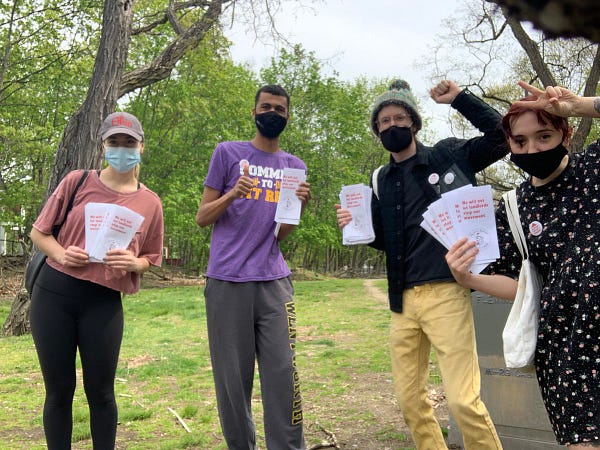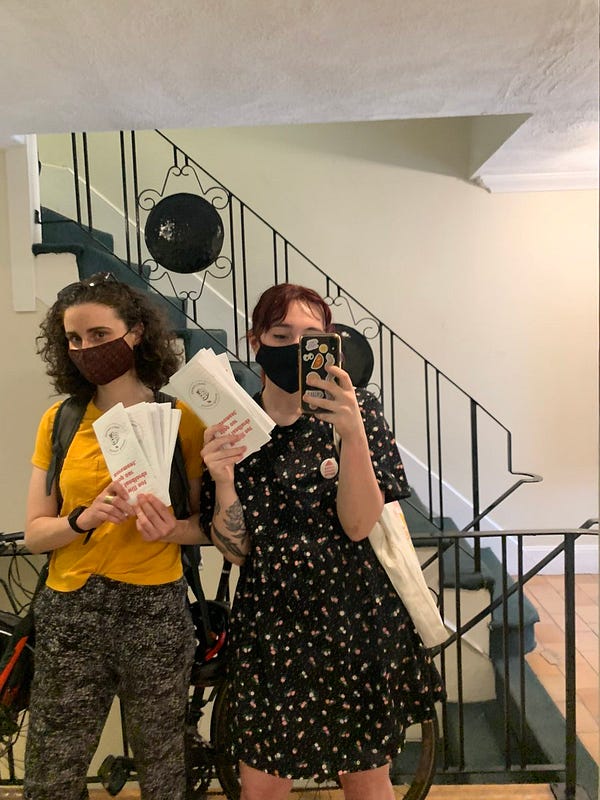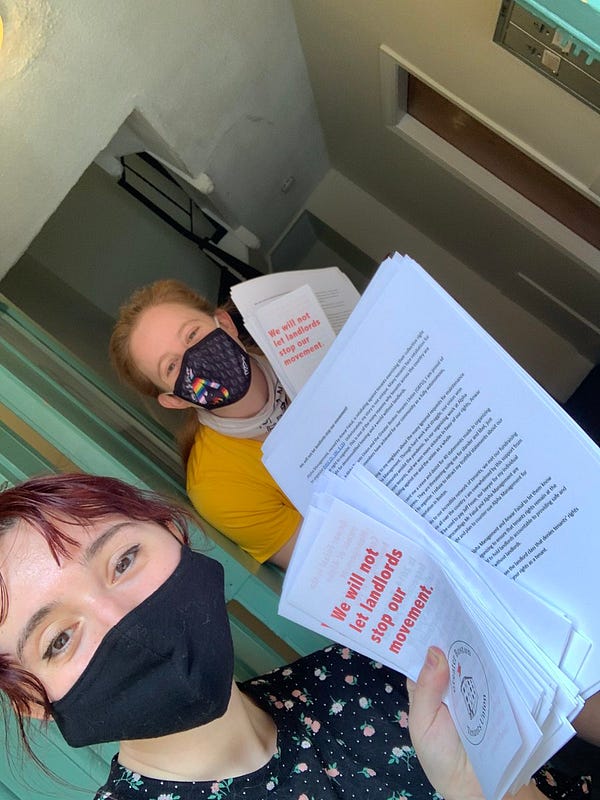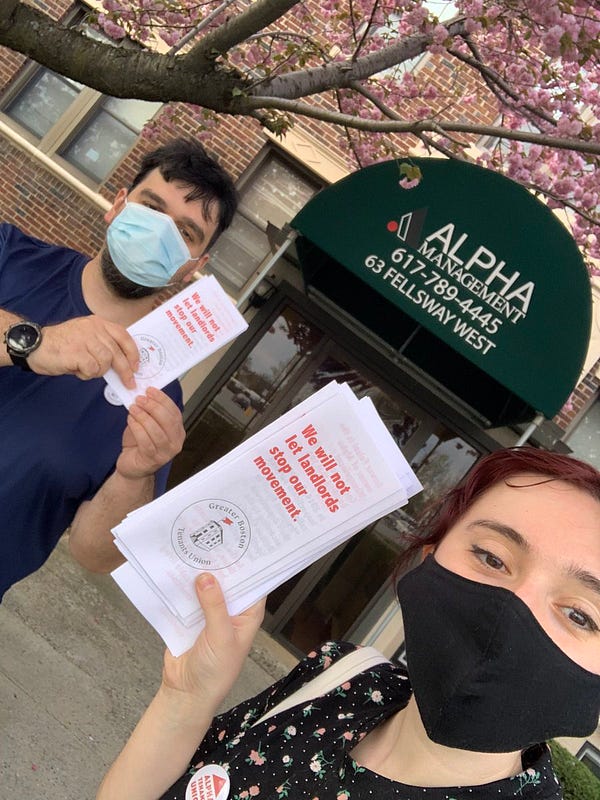
Why Doesn't Anyone Care If I Am Alive?
It has always been tenants working hard to fight for visibility and recognition and housing justice.
This piece originally appeared in Luke O’Neil’s newsletter Welcome to Hell World, which, like Discourse Blog, is a member of the Discontents media collective. Click here to get 20 percent off a subscription to Welcome to Hell World.
by Mary Stathos for Welcome to Hell World
It’s August 1, 2019, my first night in my overpriced apartment and I am crying while someone plays “Rock and Roll All Nite” down at the gas station below me. I am unpacking my clothes and placing them into a closet that is still lined with contact paper that must have seen decades of other people’s clothes by now. I told myself I would replace it later but I never did.
Some parts of this apartment have been replaced by now though. The stove after it was leaking gas. The fridge after three months of being broken and a summer eating exclusively shelf-stable food. The kitchen floor, which was an ancient artifact, its green, brown and yellow linoleum peeling back on the sides revealing the rotted floor underneath. Any repairs took months of back and forth, months of being ignored by Alpha, the management company that owns my building and around sixty others like it throughout Boston. It took countless phone calls to the Attorney General’s office and the Board of Health before anything was done. None of this is unique to me, this is simply the reality of renting in Boston and other cities like it now. You take what you can get.
What makes any 400 square foot apartment worth $1,575 a month? Is it the window that won’t stay open? The free entertainment of listening to a man on his motorcycle blasting “Memories” by Maroon 5 while he fills his gas tank fifty feet away? Maybe it’s the crack in the wall that stretches across the length of my bedroom like a lightning bolt striking the crumbling foundation of this hundred-year-old building?
Those are all appealing amenities to be sure, but more likely it was the abolition of rent control in 1994 that brought us here. It was a change that incentivized landlords to accumulate as much property as possible and to jack up rent prices annually at the expense of the poorest and most vulnerable populations. This year rents increased nationally by 5.3%, reported to be the highest increase in the past ten years, while we are still fighting for a $15 minimum wage. A wage, by the way, which still isn’t enough to afford a two bedroom apartment in 46 states. Under rent control, at least as the landlord thinking goes, the stability of long-term renters curtailed their ability to prey on us simply because they could. Landlords say they are fearful of the return of “artificially low rent” in the event that rent control returns. They say no one will want to be landlords anymore. Is that a bad thing? Why doesn’t anybody care if rent is artificially high?
Most have never cared about anything other than their passive income. And the more passive it is the better. Renters don’t have the same luxury. It has always been tenants working hard to fight for visibility and recognition and housing justice.
Tenants' unions have been active with varying degrees of power for as long as landlords have been exploiting us. In 1968, six thousand tenants were listed as plaintiffs in a lawsuit against the Boston Housing Authority. They won necessary repairs for their units, and by 1970 tenant organizing continued to grow into what became widespread rent control policies, not just in Boston, but across Massachusetts. Their victories were felt immediately, but eventually lobbying and pressure by landlords overturned the win in the mid ’90s.
Where the responsibility lies for reasonable living costs has become a game of hot potato between landlords and the state. Is it the job of the state to ensure that rents stay affordable and that tenants are provided with safe living conditions? Or should that job get passed over to the landlords, with high hopes and low expectations that under the free market they will act responsibly and justly to tenants out of the kindness of their hearts instead of “working” to turn a profit? With such few regulations in place to ensure that landlords treat their properties like anything other than passive income, who could possibly be to blame?
On a website for Massachusetts landlords, the landlords say that they can’t be the ones in charge because they admit to preferring “less risky tenants.” I think we all know what that means. They already go to incredible lengths to limit access to housing and resources for the most vulnerable. They perform background checks, credit checks, and income verification, require illegal application fees, and four months of rent upfront for moving costs. They raise rents every year, forcing families and individuals to take regular displacement as a given, never allowing us to save money or know stability. They ignore the need for routine maintenance; even a new countertop or lighting fixture is a luxury for the average renter. Shelter is one of the most basic necessities for a human being to stay alive. But they don’t care who lives or not as long as the money keeps coming in.
This hope that rent control will remain a thing of the past is not exclusive to landlords. This week Commonwealth Magazine published an article titled “Rent control is not the answer for Boston.” In it John Barros, a candidate for mayor and former chief of economic development for the city, claims that the answer to the current state of housing is not to control rents or create affordability in the tens of thousands of apartments that already exist, as he fears that it will lead to a slow down in the growth of new development properties. Rent control will actually be a boon to the wealthy, he writes.
For her part, candidate Michelle Wu seems to disagree.


Boston currently has close to four thousand vacant apartments as of March. Meanwhile there’s been a 2,781.4% increase in vacant apartments in Downtown Boston, where the average rent is around $3,540. In Roslindale, to name one “more affordable” example, the average rent is only $2,711. Perhaps an affordability strategy may be worth pursuing considering a renter there would need to make $56.48 an hour to be able to afford that rent at 30% of their income.
The city has also already tried to build affordable housing units, but they are regularly shot down by business owners and neighborhood groups. In May, Monty Gold, the owner of Turtle Swamp Brewing came forward with a lawsuit against Pine Street Inn claiming that the affordable housing unit they were trying to build would hurt businesses and reduce parking in the area. Parking is more important than people seems to be a popular sentiment throughout the city.
In 2013 Boston Magazine published the story “Lord of the Sties: Is Anwar Faisal Boston's Worst Landlord?” about the man whose family owns my building. They wrote of his empire of rental units, his disregard for tenants. They wrote on how he preys on the “less picky” students by providing poor living conditions in exchange for only moderately high rent, how he was found to be creating more units in his buildings than can safely exist, how he destroyed protected wetlands on his private island, and how, in the eyes of the law, he only acts within his rights.
It has been eight years since this story came out, about the same amount of time since Alpha’s last tenants' union disbanded after the majority of them moved out in the early 2010s due to significant rent increases and reports of Alpha illegally towing organizer’s cars from their rightful spots. The state has still not taken any meaningful action against the company, despite countless news articles, including a 2014 Boston Globe Spotlight investigation, which found that over 100 housing court cases have been brought against Alpha in the last 15 years, with hundreds of complaints filed against him.
“Anwar Faisal is one of the giants of the student apartment rental business in Boston — maybe the biggest of them all,” the Globe wrote. “Few, if any, landlords own and rent more units to students; few, if any, have a longer rap sheet of offenses against state sanitary and building codes; and no one better exemplifies the city’s ineffectiveness at policing chronic offenders like him.”
It has probably been thirty years since the cabinets in my apartment were changed. The mahogany stained particle board will see less upheaval, and will remain in one place for longer than I will ever be able to with the way that the housing market is currently going. For eight years, people have shared these articles and others like it, detailing Alpha’s known status as a usual suspect with the Inspectional Services Department, so why has the state done nothing? Why don’t they care if I am able to stay alive?
I have a suspicion that it is because of the way that they label us. We are the renters. We are not members of the communities that we live and work in unless we are tied to the inherent value of property. I always thought we had the right to life, liberty and property. I didn’t realize that we only had rights to the first two if we owned the third.
It feels almost advantageous to everyone but us, the renters, to allow this cycle to continue. Meanwhile we are bombarded with the same questions placing the blame on us:
Why don’t you just move? Why don’t you just save up four thousand dollars when you are paying more than half of your income on rent every month?
And the same comments.
Get a better job. Go back to school. Cripple yourself with debt.
And yet nobody understands how unsustainable this has become. Nobody cares if I am able to stay alive, but they are rushing us out of our homes because there are people who will pay good money to move in next. More desirable people. Not immediately, of course; this apartment is falling deeper and deeper into disrepair every day. But soon it will be time to do what cities do best. It will be time to redevelop this space into luxury apartments, continuing the trend from 2020 where we saw a 30% increase in luxury units in the metro Boston area. The renters of the apartments in disrepair are just trying to stay alive, but the renters of luxury apartments – they are trying to live. They will go to the restaurants, the wine tastings, the coffee shops. They will pay the landlords who will then pay the city. It feels like a win all around for everyone but people like us.
But we will not go quietly. We can fight back. We are fighting back. Since the Alpha Tenants Union organized in late 2020, we have won repairs for our building, blocked evictions and worked to put public focus back on the way that Alpha treats us. We know this is not new. Google Alpha Management and you’ll find countless stories of how they treat tenants. In 2016, the Boston Globe covered a story of a woman whose rent was nearly doubled after Faisal bought her apartment complex because Alpha was considering her dining room and an office space as two additional bedrooms. Other residents in this building reported problems with mice, roaches and code violations, and Alpha was cited by the city of Somerville for working without a permit, and yet the city did not pursue further action because they did not want to “single out” Alpha. Anwar Faisail is quoted in the article asking “Why should they be complaining?”
Kelly Hallman spoke with Boston Magazine in their 2013 article about her Alpha horror story. She arrived at her new apartment on September 1, 2011 with mattresses and other furniture in the hallways labeled “Bed Bugs! DO NOT TOUCH!” and caution signs from the city. She reported being able to see that the apartment had not been properly cleaned despite confirming that the previous tenants had paid a cleaning fee, and getting bed bugs shortly after moving into the apartment filled with mice, bugs, mold and mildew.
The list goes on. There have been stories of Alpha failing to act and then evicting tenants when peeping Toms drilled holes into a woman’s bedroom, illegally renting units in their buildings, creating additional units in their buildings that they are not zoned for, and other numerous anecdotal stories on Reddit threads and other places around the internet.
It is their established reputation, and yet despite this, Kim Janey, Boston’s current mayor and upcoming mayoral candidate, accepted two thousand dollars in donations from the Faisal family. (Although she recently reported that she returned the donations, she still has $96,000 in donations from other developers.)
To be clear: our movement is not centered around how to raise awareness of all of this. The awareness is there. It is instead an uphill battle towards creating a movement that centers the most vulnerable people and ensures a world where they have protections.
Massachusetts claims that it works to protect renters. There is an entire clause in their general laws protecting us against retaliation from our landlords. Landlords cannot raise our rents unfairly, evict us without cause, or refuse to complete necessary repairs if we have been organizing in a tenants union or reporting code violations to the state or demanding better living conditions. These claims of protection though, are theoretical. They require action in the court by a landlord, and a landlord who has been charged with federal fraud convictions and still operates a large property management company appears to be able to evade repercussions of retaliation pretty well.
On April 17 I received a cease and desist letter from Alpha Management threatening to sue me if I did not stop organizing and if I did not retract all public statements that I made about the living conditions in our buildings. Not the union, just me, personally. In the six page letter, they cited bogus laws that were unrelated to anything, hoping to scare me. They told me that my “reckless, harmful and illegal actions cannot go unfettered.” Then they stopped answering any of my phone calls and emails about re-signing my lease. They eventually answered one but when I said who I was they said they’d have to call me back and they never did. On June 30, my online portal account where I pay my rent was deleted, forcing my last month’s rent to be applied to July, effectively forcing me into ending my lease.
I talked to the Attorney General’s office. I talked to a lawyer. Nothing Alpha has done so far is considered illegal because they have not taken any action in the court. Because they are terminating my lease at the end of my term, they technically don’t have to evict me in the courts, unless I place myself as a tenant at sufferance – where I stay in the apartment, paying rent until they do choose to evict me, if they choose to evict me.
But I don’t want to stay here anymore. Not because I don’t want to fight, but because this uphill battle is both draining and expensive and there is no guarantee I will win. Even a win for myself personally in the eyes of the court will not wave a magic wand to fix the disrepair, the cracks in my walls, or the antique cabinets hiding the rat holes behind them. I can play a bigger role in this fight if I use this energy to fight with others instead of fighting for myself.





It feels like giving up in a lot of ways but I would argue that it is only giving up when you have a prospect of winning at the end of the road. A win for the community is going to come from our refusal to die, our demand to stay alive despite the ruling class doing everything in their power to take away our voices.
So I will move. I will say goodbye to my sunny apartment with the cracked walls and old cabinets. I will say goodbye to the mice that my cats have kept at bay and to the man playing “Lose Yourself” by Eminem at the gas station as I’m writing this, and I will move to a new apartment that is owned by another landlord, one that is also shielded by the same twisted and backwards protections that the state claims are for us. But I will keep fighting, because even if nobody in power cares if I am still able to live, I certainly care if the rest of us are.
Mary Stathos is an organizer with the Greater Boston Tenants Union and a therapist. She writes and does creative editing for a small online lit mag called Talk Vomit and encourages everyone everywhere to stand up against housing injustice, which you can do in the Boston area by getting involved at bostontenantsunion.org









